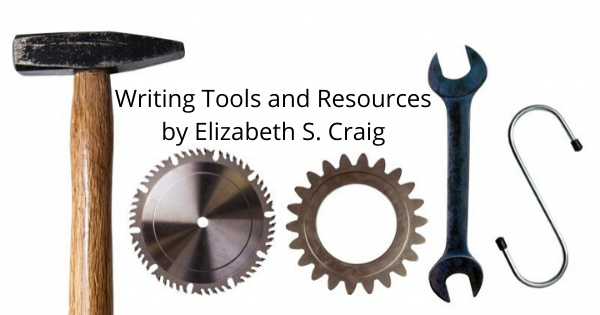by Elizabeth S. Craig, @elizabethscraig
Today I thought I’d share some of the different tools and resources I used this year to make my writing and writing life go a little smoother. Maybe some of them will make it on your Christmas lists this year. :)
I spent a little more time on story development this year than I usually do, with the start of a new series (my first new series since circa 2010). That’s why you’ll see craft-related books on the list.
Sparkling Story Drafts by H.R. D’Costa, who’s guest-blogged here, is a great book for helping writers plan their books. Glancing through the guide, I’ve written the most marginalia in these chapters: Enhancing Cohesion With Overarching Principles, Increase the Emotional Resonance of Your Ending (Without Breaking a Sweat), and The Ideal Cast Size (and How to Achieve It). This book was so useful to me that I wrote an endorsement for it. :)
Also by H.R. D’Costa is her Sizzling Story Outlines. Although I have a template that I use for outlines, I needed more for the new series. I had so many things to consider, to create. With my other series, everything always just falls into place…not so much for a new project. My marginalia is heaviest in these chapters: Getting Started via the Story Kernel, Shaping Audience Experience Via Smart Goals and the Protagonist, Conjuring Conflict to Entertain Audiences Via the Antagonist, and An Overview of the Outlining Method.
For my older series, I wanted something to help me move my mind in different directions in terms of brainstorming. When I heard about Plotto by William Cook (originally published in 1928), I was intrigued. When you first look at the book, it seems to be written in code. I’m not using the book as systematically as it’s intended, just to keep my stories fresh. Despite the fact the book was written nearly 100 years ago, it definitely helps generate new ideas. Read this article on NPR for more about the book.
I also leaned heavily on Angela Ackerman and Becca Puglisi’s Positive Trait Thesaurus, Negative Trait Thesaurus, and Emotion Thesaurus. I’d recommend these books to anyone taking character development and expression seriously. Character development seemed easy enough to me…until I started a new series, ha. I’d forgotten how tough it can be.
Now for a few tools I use daily. Google Keep helps keep me straight with both reminders and story notes on the go (free). Google Drive gives me a free place to backup my work (which I do daily). The Canned Responses extension for gmail helps me save time by creating email templates for common responses. Evernote is where I store my favorite writing-related articles (as well as recipes, etc.) And I recommend that every writer keeps a story bible of all the minutiae in their stories (I couldn’t make it without mine).
That’s what’s given me the biggest help in 2019. What are some of your favorite resources?
Helpful Writing-Related Books and Tools: Share on X
Photo on Visual Hunt

Thanks, Elizabeth, for sharing some of the tools that you use. I like it that you’ve suggested resources not just for the act of plotting and writing, but also for managing everything. Writers do so much more than just type out stories!
It’s a full-time job, whether we have time for another full-time job or not, ha!
I need to pick up those first two books.
I recommend them!
You can never have too many craft books. And it seems we all need a refresher regardless of how much experience we have.
They can *really* help. And so true about learning the craft…I think I learn something new every day!
I’ve never used a story outline template. I usually do the story arc planning I learned in high school. Time to freshen up those skills and check out these books.
Hopoe they help! They really helped my mind go in new directions (which I needed, ha.)
Angela & Becca’s books are fabulous!!!
I’ve never heard of Plotto – now I’m curious!
It’s something to see!
I read the article on Plotto before I wrote this. So interesting. Also, I’m buying the first two books you mentioned. I think I now have my plotting, outlining down to a couple of combined methods. I need help with characters. I’ve found if I write a “book” about them, so to know them better, they are NEVER what they started out to be. Thanks for your post!
Teresa
Isn’t it interesting? I couldn’t believe how much of the book was still relevant in 2019. :) The first 2 books are very helpful–well-written but really easy to follow with exercises to do. They really helped. :) Thanks for coming by!
Hi! I’m a big fan of your blog. I’m leaving this comment because you wrote: And I recommend that every writer keeps a story bible of all the minutiae in their stories (I couldn’t make it without mine). Please, please, please write a blog post about your story bible. :-) If you already have, and I missed it, my apologies.
Thanks for coming by, Karen! I’ll be sure to write a post on my story bible, thanks for the suggestion. :)